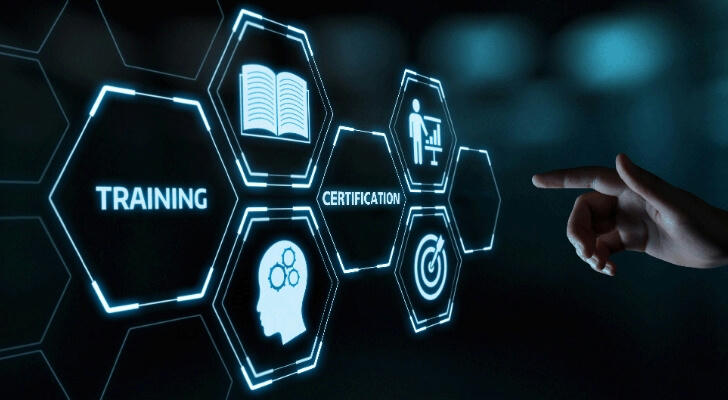Comprehensive Guide to IT Support Certification in the United States: Skill Upgrade and Career Advancement
As digital transformation accelerates, the demand for IT support talent in the U.S. continues to rise. According to the U.S. Bureau of Labor Statistics (BLS), IT support jobs are expected to grow by 8% from 2022 to 2032, with approximately 67,000 new positions. Professionals with certifications earn an average of 28% more than those without certifications (source: CompTIA 2023 report). This article provides a detailed explanation of the core value and learning strategies for mainstream certifications through real-life examples and industry insights.

1. Types of Certifications and Career Fit
1.1 Entry-Level Certifications: Pathways for Career Changers
CompTIA A+: Covers hardware maintenance, operating system configuration, and basic network security. 83% of employers consider it a must-have for IT support roles (e.g., Dell, Intel).
Google IT Support Certificate: Focuses on troubleshooting and cloud services basics, with hands-on labs integrated through Coursera. Some community colleges accept it for credit transfer.
Case 1: Retail Manager Transitioning to IT Support
Kevin Hart from Texas was previously a retail manager at an electronics chain, earning $42,000 per year. After completing a 6-month CompTIA A+ boot camp (including virtual machine troubleshooting), he learned disk array configuration and blue screen code diagnostics. He later secured a desktop support position at a mid-sized company in Dallas, with his salary increasing to $58,000. The company also sponsored his Network+ certification.
Recommendation:
Choose courses that include real ticketing system simulations to enhance service workflow handling.
Highlight keywords such as "Active Directory management" and "endpoint device deployment" in LinkedIn resumes to improve algorithm recommendations.
1.2 Advanced Certifications: Specialization in Vertical Fields
Cisco CCNA: Focuses on network architecture and protocol security. Certified professionals can manage enterprise-level routers and switches, with a median salary of $74,000.
Microsoft Azure Administrator: Focused on cloud environment operations, with a demand growth rate of 39% (Microsoft 2024 skills gap report).
Case 2: School Network Administrator Upgrading to Cloud Operations
Emily Chen from Oregon was previously a network administrator for a school district, earning $53,000 annually. After completing the Azure Administrator certification, she learned hybrid cloud deployment and resource monitoring tools (such as Azure Monitor). She now works as part of a cloud architecture team at a healthcare group in Portland, with her salary increasing to $81,000, and she participates in HIPAA compliance audit projects.
Recommendation:
Practice VPN gateway configurations using Microsoft's Learn platform sandbox environment to avoid mistakes in production systems.
Participate in ISC²'s foundational cybersecurity course (Self-Paced) to strengthen cross-domain knowledge integration.

2. Core Modules of Certification Courses and Efficiency Enhancement Methods
2.1 Optimizing Troubleshooting Methodology
Pain Point Case: A trainee in Michigan spent 3 hours troubleshooting a false network connection issue, only to find that the root cause was a DNS configuration error.
Solution:
Apply a layered diagnostic model (Physical Layer → Network Layer → Application Layer) and use Wireshark to analyze protocol anomalies.
Build a quick reference guide for "error codes—solutions," such as mapping the 0x80070005 error to a Windows permission repair process.
2.2 Integrating Automation Skills for Operations
Data Insight: PowerShell scripting ability improves ticket processing efficiency by 47% (source: Forrester 2024).
Training Strategy:
Use Codecademy’s PowerShell course to write scripts for automatic deployment of printer drivers.
Create a personal project repository on GitHub and publish network port scanning tool code to enhance job competitiveness.

3. Exam Strategies and Institution Selection Tips
3.1 CompTIA A+ Dual Exam Strategy
Core 1101 Subject: Use Anki flashcards to reinforce memory of RAM types and timing parameters.
Practical 1102 Subject: Practice Linux permission management (e.g., differences between chmod 755/777) repeatedly in VirtualBox.
Recommended Resources:
Purchase ExamCompass's question bank (focusing on performance-based questions).
Take a Pearson VUE offline mock exam to adapt to timed pressure environments.
3.2 Certification Vetting Red Flags
Risk Case: An unverified "Cisco-affiliated certificate" from an institution in Nevada led to a student's exam disqualification for CCNA.
Avoidance Strategy:
Confirm that the training provider is a CompTIA Authorized Partner or a Microsoft Learning Partner.
Verify that instructors hold certifications for at least 3 years and have real-world enterprise operations experience.
4. Career Advancement Paths and Resource Network
4.1 Salary Premium Pathways
Compliance Operations: Mastering GDPR/HIPAA technical implementation standards can increase salaries by 34% compared to basic roles.
Remote Support Engineer: Professionals with experience in enterprise tools like Splashtop or TeamViewer may be hired by employers across state lines.
4.2 Building a Resource Network
Industry Communities: Join the Spiceworks forum for the latest vulnerability alerts and patch solutions.
Hardware Labs: Purchase a second-hand Cisco switch (with a budget of $300) to build a home CCNA lab environment.
Conclusion
The value of IT support certifications lies not only in passing exams but in developing systematic technical thinking and automation problem-solving skills. Professionals should solidify CompTIA A+ core skills in the early stages, and later branch into high-growth areas like CCNA or Azure certification. It’s recommended to participate in technical Q&A on Reddit's SysAdmin board quarterly to stay attuned to trends like Zero Trust architecture. Employers often prefer candidates with multiple cross-certifications (such as A+ and ITIL) and provide management training programs for them. Continuous learning is the core principle for career advancement.
